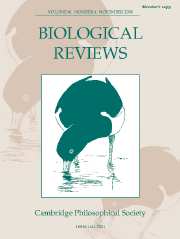Article contents
Duet-splitting and the evolution of gibbon songs
Published online by Cambridge University Press: 25 March 2002
Abstract
Unlike the great apes and most other primates, all species of gibbons are known to produce elaborate, species-specific and sex-specific patterns of vocalisation usually referred to as “songs”. In most, but not all, species, mated pairs may characteristically combine their songs in a relatively rigid pattern to produce coordinated duet songs. Previous studies disagree on whether duetting or the absence of duetting represented the primitive condition in gibbons. The present study compares singing behaviour in all gibbon species. Various vocal characteristics were subjected to a phylogenetic analysis using previously published phylogenetic trees of the gibbon radiation as a framework. Variables included the degree of sex-specificity of the vocal repertoire, the occurrence of solo songs, and the preference for a specific time of day for song-production. The results suggest the following scenario for the evolution of gibbon songs: (1) The last common ancestor of recent gibbons produced duet songs. (2) Gibbon duets probably evolved from a song which was common to both sexes and which only later became separated into male-specific and female-specific parts (song-splitting theory). (3) A process tentatively called “duet-splitting” is suggested to have led secondarily from a duetting species to a non-duetting species, in that the contributions of the pair-partners split into temporally segregated solo songs. This appears to be the first time that a non-duetting animal can be shown to be derived from a duetting form. (4) The return to exclusive solo singing may be related to the isolated island distribution of the non-duetting species.
Keywords
- Type
- Review Article
- Information
- Copyright
- Cambridge Philosophical Society 2002
- 199
- Cited by


